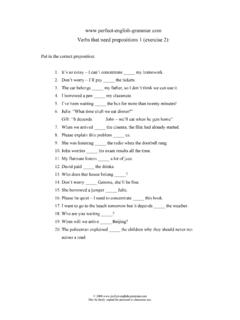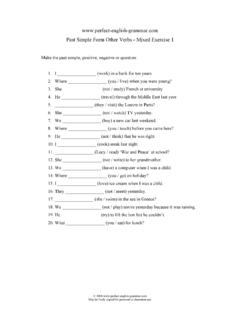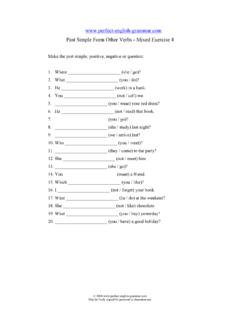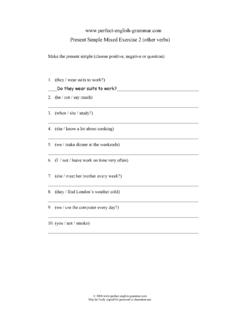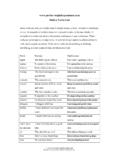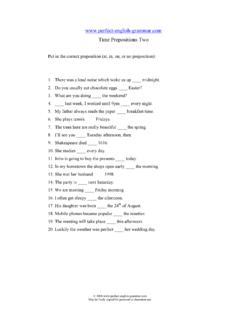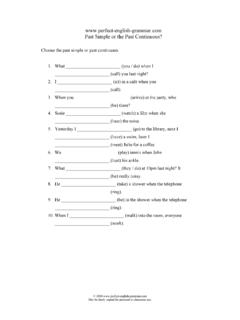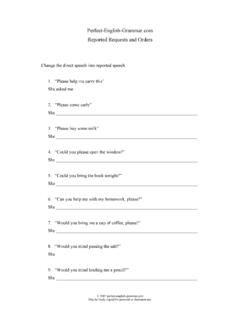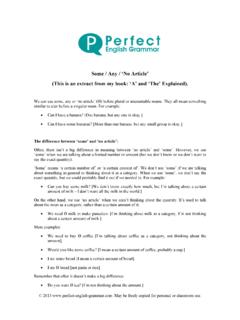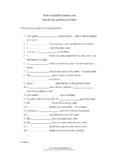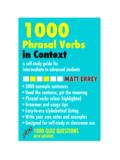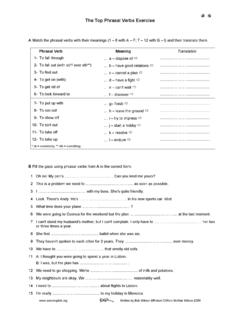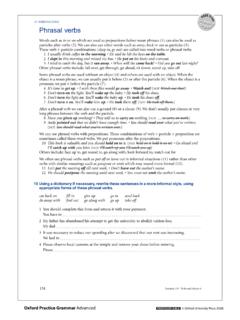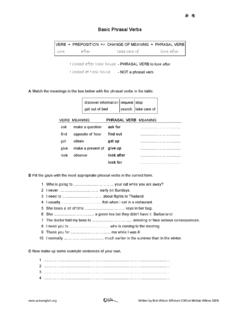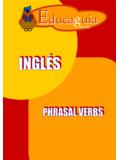Transcription of 20 most important phrasal verbs
1 2008 english May be freely copied for personal or classroom use. 2 Contents: Grammar of phrasal verbs 2 Deal with 3 Come across 5 Get on with 7 Look after 9 Pick up 11 Review 1 13 Put on 14 Take off 16 Look into 18 Turn down 20 Look forward to 22 Review 2 23 Answers 24 2008 english May be freely copied for personal or classroom use. 3 The Grammar Of phrasal verbs : There are four different types of phrasal verb : TYPE 1: intransitive: these verbs do not have a direct object: take off the plane took off. TYPE 2: transitive and separable: these verbs need a direct object, and the preposition can be separated from the main verb if the object is a noun it can go before or after the preposition if the object is a pronoun, it must go before the preposition tell off the teacher told off the student, or the teacher told the student off, or the teacher told her off, but NOT the teacher told off her TYPE 3: transitive and inseparable: these verbs need a direct object, but the preposition cannot be separated from the main verb look after I look after my nephew, or I look after him but NOT I look my nephew after, and NOT I look him after TYPE 4: verbs with two prepositions: these are also transitive and inseparable run out of we have run out of milk, or we have run out of it, but NOT we have run out it of If phrasal verbs are followed by a verb , it is always a gerund ( verb ing).
2 This is true even if the preposition is to . For example: I am looking forward to seeing you. 2008 english May be freely copied for personal or classroom use. 4 Deal with (deal is an irregular verb : deal, dealt, dealt) Julie: Look at all this mess in the kitchen! John: Don t worry I ll deal with it as soon as I ve finished my lunch. Here are some more examples: I ll deal with the washing up later. Could you deal with this report now? After I d dealt with the bathroom, I started cleaning the living room. Julie s dealing with the problem now. I ll deal with the children s dinner later I think I ll give them pasta. What does deal with mean? 1) take the necessary action 2) clean or tidy a room We mostly use deal with when there is a problem that needs to be resolved, or something we need to do. When we use deal with (for example, I ll deal with the kitchen) we think the person we are talking to will understand that we mean clean , perhaps because he or she has seen the dirty kitchen.
3 If the meaning is not clear, either because the person doesn t know the situation, or because the thing we need to do is not obvious, then we use another verb . Deal with is a type 3 phrasal verb . Are these sentences correct? I ll deal with the paperwork tomorrow. I ll deal it with tomorrow. I ll deal with it tomorrow. I ll deal the paperwork with tomorrow. I ll deal with. 2008 english May be freely copied for personal or classroom use. 5 Make sentences using deal with : I need to _____. The shop assistant should _____ politely. I ve already _____. Other meanings: The shop assistant is dealing with a customer now. Julie often deals with difficult clients. deal with = talk to / discuss with someone This book deals with the relationship between sisters. The film deals with the horrors of war. deal with = be about / talk about 2008 english May be freely copied for personal or classroom use. 6 Come across (come is an irregular verb : come, came, come) Julie: Hi John, how are you?
4 John: Great! I just came across 40 in my winter coat! Julie: Fantastic coffee s on you! Here are some more examples: I came across some money in the street. She came across some old photographs when she was cleaning the attic. We came across the perfect present for Li while we were shopping. He came across a lovely caf in Cambridge. What does come across mean? 1) Find something you were looking for. 2) Find something you weren t looking for. Come across is used when you aren t looking for something, but you find it while you are doing something else. Come across isn t generally used for people, instead we use run into . Come across is a type three phrasal verb . Are these sentences correct? I came across the photos. I came them across. I came the photos across. I came across. I came across them. 2008 english May be freely copied for personal or classroom use. 7 Make sentences using come across (use the past simple): Lucy _____ yesterday.
5 I _____ in a shoebox. I _____ in the bathroom. Come across Other meanings: John comes across as a bit boring, but he s lovely when you get to know him. Lucy came across really well during the interview. come across = give an impression (of your character) (this meaning is type 1, notice we need as if we want to add more details except when we use well or badly ) The artist s love for his wife really comes across in this portrait of her. He says he feels passionately about the subject, but that passion doesn t come across in his writing. come across = be easily noticed / be clear (when we are talking about an idea expressed in writing / art / film / poetry) (this meaning is type 1 notice the in when we add the types of art / poetry etc) 2008 english May be freely copied for personal or classroom use. 8 Get on (with) (get is an irregular verb : get, got, got) Julie: I really need a new job! This one is so boring, and although I get on with my colleagues, I don t get on very well with my boss.
6 John: Why don t you two get on? Julie: He isn t very polite, and he doesn t consider other people s opinions. Here are some more examples: I get on really well with my sisters. She doesn t get on with her mother in law. We get on very well, even though we don t see each other very often. He and his sister don t get on. What does get on (with) mean? 1) Have a friendly relationship with someone. 2) Spend a lot of time with someone. Get on (with) is both a type one and a type four phrasal verb . When it doesn t have an object, we don t need with in this case it is type 1. In this case, the two (or more) people who have a good relationship are the subject of the verb : Julie and John get on. If we want an object (if we want to put one of the people after the verb ) we need with . In this case, this phrasal verb is type four: I get on well with Lucy. We can use well very well really well with get on and get on with.
7 They go after on , or after the object: We get on very well. I get on really well with Julie. He gets on with his boss very well. Which sentences are correct? I get on well with my mother in law. I don t get on with. She doesn t get on her brother with. We don t get on. I get on really well. 2008 english May be freely copied for personal or classroom use. 9 Make sentences using get on with : I _____. I _____. I _____. 2008 english May be freely copied for personal or classroom use. 10 Look after Julie: Could you look after my suitcase for a second? I just need to buy a bottle of water. Li: Sure, no problem. Here are some more examples: My mother looks after my cat when I m on holiday. I look after my daughter in the mornings, and she goes to nursery school in the afternoon. Would you look after this client, please John? You need to look after your plants if you want them to live! What does look after mean?
8 1) to be responsible for, take care of. 2) to carry Look after is a type 3 phrasal verb . Which sentences are correct? I look after my nephew. I look after him. I look him after. I look after. I look my nephew after. Make sentences with look after : Would you mind _____ this weekend? 2008 english May be freely copied for personal or classroom use. 11 Could you _____ for a minute? The babysitter is _____ this evening. 2008 english May be freely copied for personal or classroom use. 12 Pick up Julie: Hello? Is that Lucy? Lucy: Hi Julie, where are you? Julie: I m still on the train. We should arrive in about half an hour. Lucy: No problem. I ll come and pick you up at the station. Here are some more examples: I ll pick you up at 8pm at your house, and we can go to the party together. David is picking up his friend at the airport he should be back soon. My mother used to pick me up after school. Could you pick up my scarf on your way home?
9 I left it at Julie s flat. John: How did you get home from the airport? Jill: My sister picked us up. What does pick up mean? 1) collect / go somewhere to get someone or something 2) drive someone somewhere in your car Pick up is a type 2 verb . Which are correct? I picked up Julie. I picked up her. I picked up. I picked her up. I picked Julie up. Make sentences using pick up : I m going to _____ from the airport at 3. 2008 english May be freely copied for personal or classroom use. 13 Will you _____ from the station later? I need to go into town to _____ this afternoon. Other meanings: Pick up has a lot of meanings here are two more. Could you pick up the baby please she s crying and wants a cuddle. I can t pick this suitcase up it s too heavy. pick up = lift, raise up using your hands He picked up a lot of German when he lived in Berlin. Don t worry if you don t know how to use the computer very well you ll soon pick it up.
10 Pick up = learn informally, without really studying, but by using the language / computer etc. 2008 english May be freely copied for personal or classroom use. 14 Review 1 Match the verbs and their meanings: pick up find by chance come across have a good relationship with deal with collect look after take care of / be responsible for get on with do whatever is necessary Put in the correct phrasal verb (you might have to change the form of the verb ): I m going to the airport to _____ Julie. Would you mind _____ my bike for a moment while I run to the shop? I ll _____ the kitchen later, after I get home from work. I know it s very untidy. John _____ some photos of his grandparents in the loft yesterday. I _____ very well _____ all my family we are very close. 2008 english May be freely copied for personal or classroom use. 15 Put on (put is an irregular verb : put, put, put) Mum: Put your coat on! We re going out.
